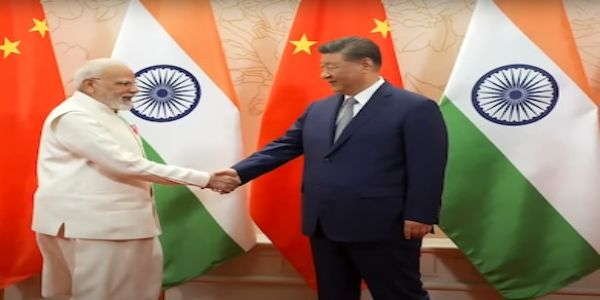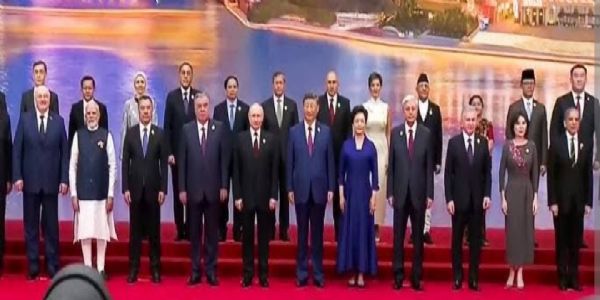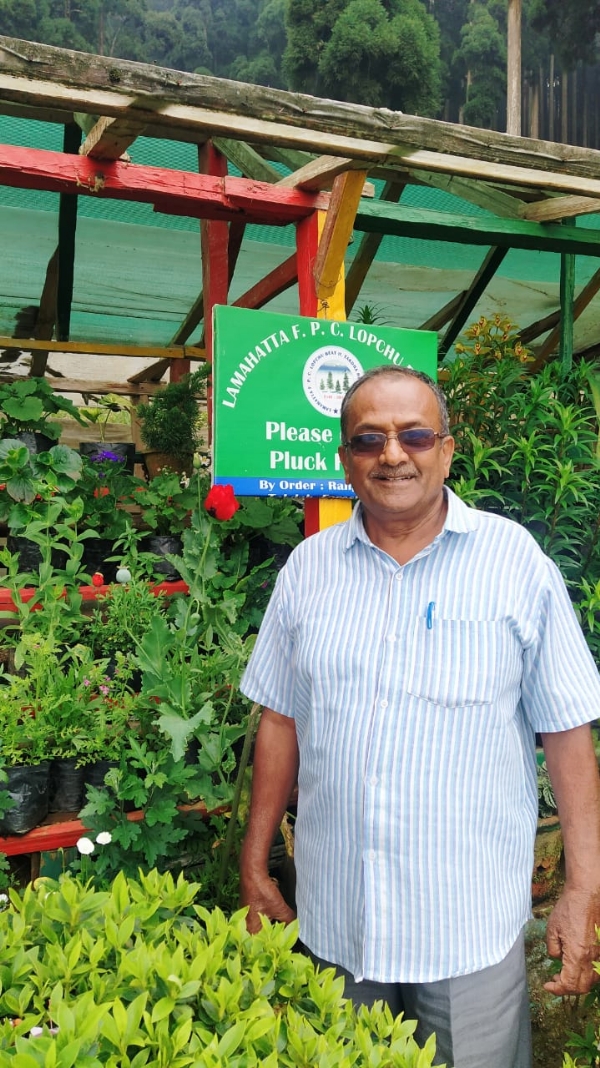
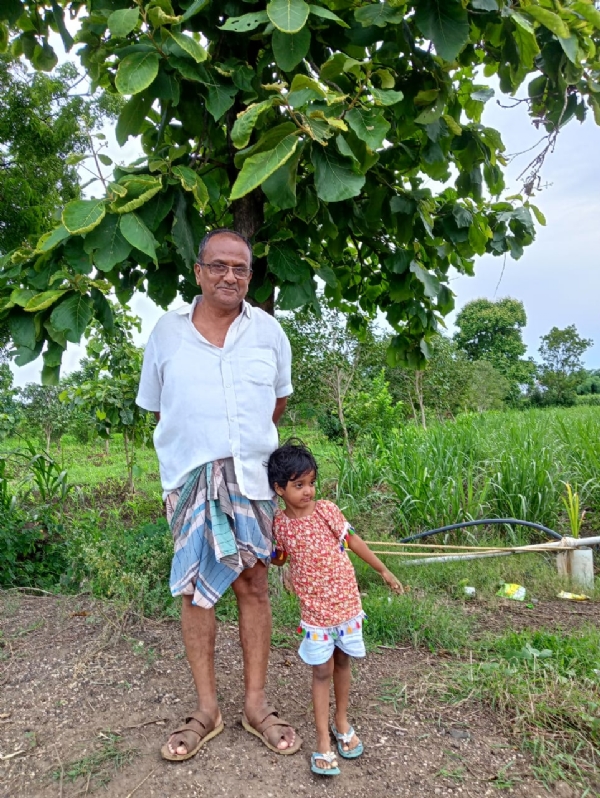
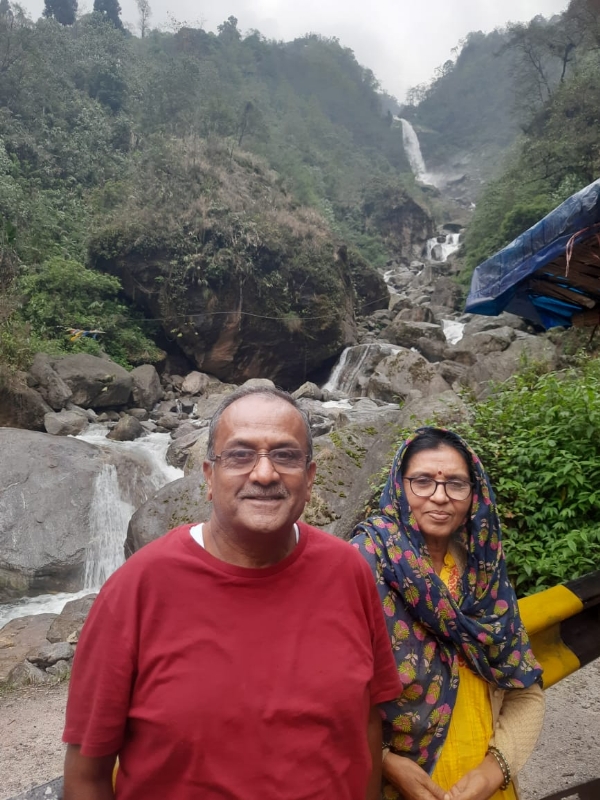
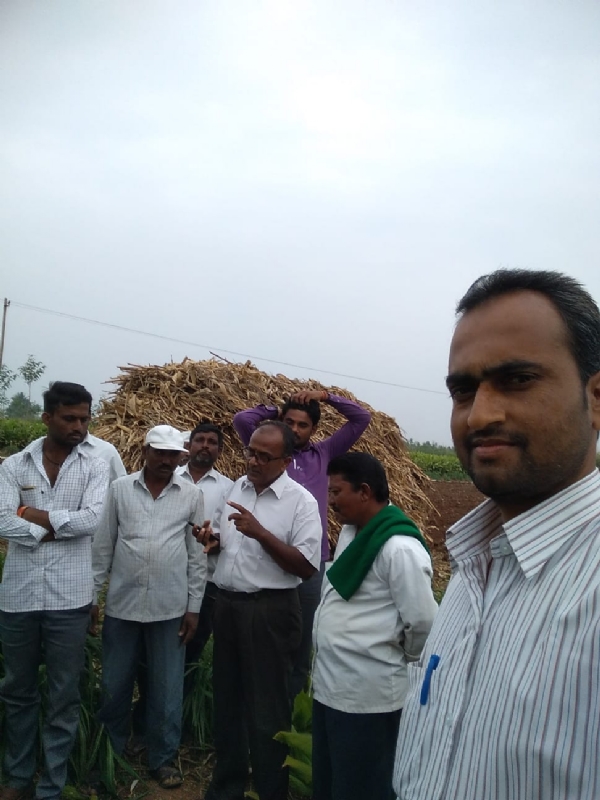
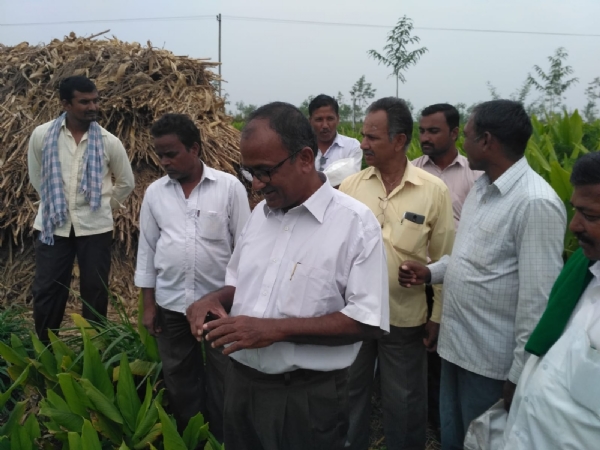
Labour Problem: Not an Excuse to Thrive in Farming-S R Byakod Bengaluru, 31 August(HS): Shivayogi Revanasiddappa Byakod of Ranna Belagali, near Mahalingapur town in Mudhol Taluka, Bagalkote district, is a successful and progressive farmer who has risen to success through hard work. After graduating with a postgraduate degree in Agricultural Sciences from the University of Agricultural Sciences, Dharwad (UASD), he struggled to make a living as a humble agrarian. Thanks to the timely sermons of late Sri Siddeshwara Swamiji and the friendly bonding of his father with Satyakama, a journalist turned philosopher and a mystic, S R Byakod's initial failures became the steps for a successful career as an agri consultant. With the launch of Sneha Agri Clinic, there was no looking back, and it was only success and more success all along.
God has given everything and two curses! Shivayogi R Byakod opines-God has given everything, pure water, air, food, and unthinkable freedom, among many others, to the peasant. However, at the same time, he has also bestowed them with two curses, namely ignorance and disbelief! But, to set right this perplexed predicament, there is a grave necessity of effort, specifically oriented guidance and patience from both sides, in the sense of the giver and recipient...
...Hunger for knowledge should come from within: In comparison, thanks to the ever-transforming technology, getting things done by cooperating has become much easier. Yet, the urge for hunger for knowledge has to come from the self, and it cannot be felt by telling or listening...
...We ourselves are responsible: Abundant and reckless use of Chemical fertilisers and pesticides has taken the lives of human beings for a ride, and we alone are responsible for this paradoxical condition.
In a freewheeling chat sometime back, Shivayogi R. Byakod dwelt in detail on the oft-repeated subject of farm labourers' crisis in the agricultural sector and pooh-poohed all claims and arguments in this regard. Excerpts from the conversation:
Q: How do you define the present generation of farmers?
Shivayogi R Byakod: First of all, without food, no man can survive. As a political scenario or geographic scenario, or agricultural zone-wise scenario, there are two classes of farmers: dry land farmers and irrigated farmers. Irrigated farmers definitely would have a commercial approach, and they just would like to make good money out of a given amount of time and land. Definitely.
Q: These days, all farmers lament about the scarcity of farm labourers throughout the year. How do you feel is the ground situation?
Shivayogi R Byakod: If you have the will to keep moving, irrespective of whatever prevailing situation, then all these so-called labour problems are nothing but lame excuses for not doing things the expected way. For this labour availability and all those things, the technology has changed, and there are very good many blessings in disguise. That's what we are observing. Earlier, bullocks used to be part and parcel of every farm holding. Now that machinery has taken up, small tractors have come up. So in this sense, the farmer is going to opt for innovative measures and means to overcome a malady.
Q: So, in other words, you mean to declare that there is nothing like a labour problem at all?
Shivayogi R Byakod: Now, earlier, there used to be hardly sparingly farmers who used to use herbicides. Now that herbicides are available for each and every crop, be that soybean, corn, sugarcane, turmeric or anything for everything, there are chemical measures. See, in my own farm, 36 acres of land, for the last three years, not one woman labourer have we employed for weeding. Meaning to say, there are methods and means to overcome a shortage of labour or manpower.
Q: According to you, thanks to modern equipment and chemicals, the earlier situation of being heavily dependent upon manual labour is no more there?
Shivayogi R Byakod: Wherever manpower is involved, say during the course of sugarcane harvesting, something like that, wherein intense operations are going to take place, or for example, turmeric, digging, sorting, grading and all those operations, mechanical means have been employed. Sugarcane, mechanical harvesters are there, turmeric, again, mechanical. Still, there seems to be inevitability as to depend upon certain labour. Then we would be opting for paying more. Paying more, say, when we are paying 200 to 300 rupees for weeding, for such operations, for horticulture, for harvesting and for all other operations, we would be paying more. Because it will be more contractual.
Q: Is it the same story when it comes to harvesting the crops as well?
Shivayogi R Byakod: So, as and when the situation arises, it all depends upon the price of the end of production. As a matter of fact, to put you in a nutshell, for a soybean example, the maximum cost-to-benefit ratio crop it is, with a minimum amount of investment, a farmer is going to derive maximum benefit from soybeans. But for manual harvesting and the work we used to do earlier, now mechanical harvesters have come up. But for combined machines, paddy is being cultivated. So is the case in our area for wheat and dacoctum wheat. For the presence of combined machines, the farmer is opting for, and is thinking of growing all those crops.
Q: But, will this type of shifting over to a mechanised way of yielding farm produce be beneficial to the growers?
Shivayogi R Byakod: For green gram, for pulses, for tur, all things, everything, mechanisation is happening in their own way and pace. That's what the trend actually is. So inevitably, what you call, indispensability of labour is held up. Meaning to say, there are means and measures to overcome. First, wherever a farmer has to have captive manpower, they would derive maximum benefit. Because there is good supervision, a good amount of tending would be made.
Q: On the whole, do you term the change in situation a positive development for the tillers?
Shivayogi R Byakod: No. Wherever absentee management is there, the farmer is to incur losses. You mean to say that the farmer is evolving himself to modern equipment. Yes, yes, yes. It is a need of the hour. See, it is becoming more prevalent these days, recently in our state. Whereas in Gujarat in Kerala, or Punjab, things have happened long ago in the past. For example, Maharashtra. Wherever, see it all depends upon the population density and per capita income and disparity in the society. Wherever workers are there, our own people aren't going for migratory labourers to South Canada and the Malnad area. They used to go earlier, but now they have plashed their own funds, and they have made money, and they have bought lands, and they are doing well. And they themselves have turned out to be good growers. All in all, to say, there is a good development, a positive development of the socio-economic aspects of a farmer. This is definitely what I am observing.
Q: What about the conditions in the wet terrain, like Paddy growing regions?
Shivayogi R Byakod: See, for example, in the Gangavathi belt, the paddy area. So there is an option, minimal labour, captive manpower is there and in this also a contractual agreement. Farming is there and they are in spite of knowing fully well that it is in remunerative, still people are opting for that. That is something that is not admissible for all farmers. For small holdings, fine. For bigger farmers, again, fine. But small farmers, smaller farmers, marginal farmers say between 10 to 12 and 13 acres of land, it is uneconomic. They have to opt for these labourers, and the cost will increase.
Q: Is it also in the same fashion, even in the dry land areas?
Shivayogi R Byakod: But whereas in dry land areas, for tour or groundnut areas or bajra and all those crops, they are definitely non-remunerative. But still, people will be there. But there, dependency on labour is less, captive manpower, and few people will be there. For example, sorghum. Where our manual harvesting is out of question. But for fodder value has improved. The value of the fodder has improved and gained a big momentum, and so have the people. In the case of sugarcane growers, in due course of time, sugar is going to become a by-product. Whereas the main crop will be either alcohol or concentration, or other organic acids or something like that.
Q: In other words, you mean to say that the very approach to cultivation has totally changed?
Shivayogi R Byakod: So, as and when times change, the priority, the very approach of the farmer has also changed. And agriculture is becoming more of a commercial enterprise. They are very happy to make money out of it rather than slogging for no good. Farmers have become wise enough to say that whenever it is uneconomical to cultivate, they either lease it out to fellow sharecroppers. Sharecropping is going to come up like anything. And those people are sharing on a lease basis; they are just going to rent out their lands. And there are people to manage and run the show.
Q: So, just like they used to say, soon after independence, Industrialise or Perish, the farmers need to become mechanised now to flourish?
Shivayogi R Byakod: Either way, one thing is true: that agriculture is definitely paying, and it is going to become remunerative, and it is definitely rewarding, provided he uses his decision-making process, and that is what you call judgmental calculation, strengths, weaknesses, opportunities, and threats have to be very well thought of. Then only farming is going to be fun. Otherwise, if I am going to listen, for example grapes. Grapes, it is definitely very much scientific, technical and decision, very critical management is needed. And then the farmer has to be upright, and he is vigilant and aware and alert, then only he can very well manage with scientific know-how, then it is going to become very remunerative. Otherwise, if he is going to ask some damn dickhead, nothing, it will not be remunerative.
Hindusthan Samachar / Manohar Yadavatti





